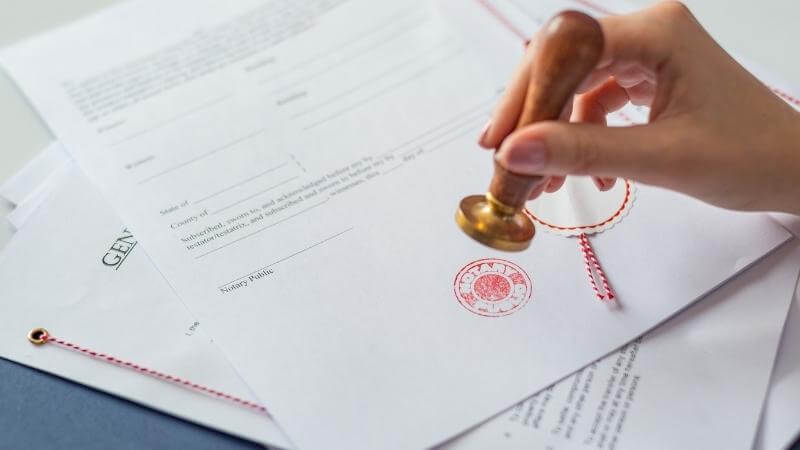What is a notary?
A common law notary public (also known as a public notary or notary; plural: notaries public) is a public officer appointed by law to assist the public in non-disputable affairs such as regular monetary transactions, estate, deeds, powers of lawyer, and ranging from international trade and business.
A notary’s main responsibilities include validating a person’s signature (for the reason of signing documents); administering oaths and proclamations; taking affidavits and statutes proclamations, including that of witnesses; authenticating the execution of some classes of records; taking citations (e.g., of deed and other conveyances); protesting notes and exchange bills; providing notice of foreign draft; preparing marine or ship’s protest movements in cases of Notarial acts, or notarizations, are the terms used to describe such transactions.
Notaries are particularly concerned with the identification and authorization of signature, authority, and capacity in documents intended to be used outside of the United States. They are also permitted to engage in regular legal activity, including such conveyancing and probates (with the exception of judicial proceedings). They have the authority to act as a Commissioner for Oaths.
Most of the notaries public are also solicitors, however, the Scrivener Notaries and about 150 regular notaries are not. According to the National Notary Association, the United States has 4.4 million notaries. They are all working for the state or territory that gave them their license.
Role of a public notary
All notaries are required to undergo continual training and are obliged to adhere to the standardized procedures. While a notary public can provide legal assistance in a variety of situations, they are most commonly used in real estate transactions. As a result, the activity of a notary public is limited to non-disputable legal affairs including such:
- Contracts
- Power of lawyer
- Notarizing documents
- Real state
- Business
- Wills and documents
If you need legal counsel or help with personal paperwork or real estate transfer, contacting a Notary Public is an excellent alternative.
Notary publics provide legal assistance that affects a variety of institutions by administering oaths and assurances. Affidavits and statute declaration; attributions of deeds and some other conveyance; contesting notes and exchange bills; and delivering notice of foreign drafts are among their tasks.

What is a lawyer?
The word “lawyer” is referred to in a variety of ways around the world. Lawyers are known by several different names, including attorneys, barristers, counsel, and solicitors. The origins of the profession can be traced back to ancient when rhetoricians were called upon to speak on behalf of friends or people. Rhetoricians could not be compensated for their service, nor could they establish themselves as a legal profession, despite the fact that they functioned as legal counsels. When Emperor Claudius recognized the profession and repealed the fee restriction in 204 BC, the first lawyers in the Roman Times received remuneration for their work.
The role of a lawyer
Advocates and advisors are the roles of lawyers (or attorneys). As advocates, they defend one of the litigants in a civil or criminal trial by providing proof and reasoning to their client’s advantage. They serve as advisors to clients, advising them on their obligations and rights and recommending courses of action in business and personal problems. Lawyers look into the objective of laws and judicial judgments, as well as adapting the law to their client’s specific circumstances.
Lawyers oversee the work of a legal assistant, paralegal, and legal secretary. Based on where they practice, lawyers might have a variety of titles and duties. Lawyers frequently alluded to as partners serve corporations and individuals in law firms. Criminal lawyers/defense lawyers are those who counsel and defend the convicted.
A notary and a lawyer are not always the same thing
Lawyers are not always notary public. They can, however, being a notary does not mean you have to be a lawyer. The conventional view of a notary public is that their signatures serve as a form of official approvals—a rubber stamp that lifts the document’s content. However, this is not the case.
A notary’s training, duties, and authority are confined to witnessing and external confirmation unless they are also lawyers (that the documents being signed is, for instance, a power of lawyer). Only a lawyer registered in your state can give you advice, explanations, or confirmation about the substance of the papers you’re about to sign.
A notary performs a discrete purpose in the United States, depending on a relatively limited mode of verification. A notary is ought to be a United States citizen who is a minimum of 18 years old and has lived in their present state for at least six months. Several states need a screening and/or further testing or training, although in most cases, the ability to evaluate personal identification papers and define the papers to be agreed to sign is all that is needed.
A notary is also responsible for ensuring that the people who signed are aware of the process of signing, are not inebriated, and are not going to sign under coercion. They may be needed to conduct an oath from a signer objecting to the document’s content in some situations.
A notary has the power of giving the following verifications:
- That a paper’s signer is who they claim they are
- That a signer has made a vow to the highest possible standard that the content of a signed affidavit is truthful and accurate.
- The authenticity of a paper has been verified by an uninterested third party.
- Copies of some documents must be certified.
To become a notary, you only need to meet a few qualifications. The scope of their jurisdiction is similarly limited. A notary cannot validate a signing that occurred outside of their supervision, nor can they deliver information that would be considered legal advice, including a view on a transaction. This is not to argue that a notary’s witnessing duty is unimportant; on the opposite, verifying the identification of a signer to legal papers is a critical step in preventing fraud resulting from the use of someone else’s or a false name in a written transaction.
It is worth noting that there is a difference, a problematic one—between a notary public and a notary public, a distinctive quasi-legal title with added legal experience and power in many Latin Countries. A notary might be required to be a lawyer in some situations, such as in Mexico. A notary can draft papers and evaluate their legitimacy and compliance under the laws of other countries.
A notary is not a generalized form of a lawyer, and therefore, must not be called or depended on. A notary has only confirmed that the signer’s ID matches the name registered, and perhaps that the signer has committed to the validity of the document’s content when they sign documents. Speak with a knowledgeable and experienced lawyer if you ever need assistance preparing, analyzing, or comprehending the content of legal papers.

When to employ a notary public instead of a lawyer?
Difficulties can emerge when notarizing papers. A notary might well be required to refer you to a lawyer for legal guidance in this situation. If you engage a lawyer to notarize, He or she might be willing to assist you with any complications that happen on the spot. Lawyers have knowledge and skill in a broad variety of subjects, but notaries are only permitted to give legal advice in the aspects of practice in which they are licensed to practice (which is very limited).
Lawyers have better formal education and practical knowledge and experience. Law students study law full-time for 3 years after completing a 4-year academic degree. Lawyers need to finish 10 weeks of intense instruction after graduating from law school and take a set of bar admission examinations. After that, law students need to work for 10 months for an apprenticeship with an experienced lawyer before they might practice on their own.
The most important thing to keep in mind while dealing with court papers is that what appears to be easy might actually be complicated. Lawyers have a better understanding of how the law is applied to your issue than notaries. If you’re using the judicial process without fully comprehending the laws and their consequences, you might have potential losses and drawbacks. A lawyer can assist you with any concerns that occur in your matter.
Clearly, we do not need a lawyer for small issues or claims every day. We don’t need a notary every time. So It is very necessary for you to understand the differences between a notary’s and a lawyer’s role in society. Otherwise, anyone will be badly confused about whom he or she needs in his or her issue as well as how to proceed with solutions to their problems. Keep in mind, whether you choose the right support or not, only you will be held liable for all the consequences.
